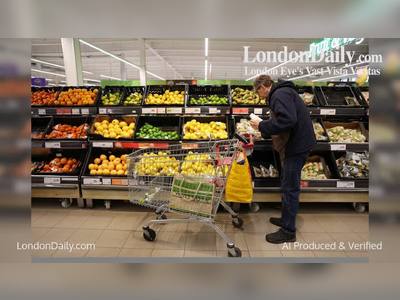UK Consumer Optimism Plunges Ahead of November Budget
Retailers warn sentiment has fallen sharply as households brace for tax and cost-of-living pressures
British consumers’ optimism about the economy and their personal finances recorded their sharpest monthly fall this week, according to data from the British Retail Consortium (BRC).
The drop comes as the government prepares to deliver its annual budget later this month and ahead of the peak Christmas shopping season.
The BRC, which commissioned the survey in partnership with Opinium, reported that the net balance of household expectations for the UK economy over the next three months fell to minus 44 per cent in November from minus 35 per cent in October — the weakest since April and the largest month-on-month decline on record in that period.
Household expectations regarding their own finances for the next three months dropped to minus 16 per cent from minus 11 per cent.
The trade body cited a combination of factors for the loss of confidence: sharp increases in utility and household bills; the impact of recent trade sanctions announced by the Donald Trump administration in the United States on UK imports; and government hints earlier this year that the main rate of income tax might rise for the first time since the 1970s (a proposal which now appears to have been shelved).
BRC Chief Executive Helen Dickinson said: “With Christmas fast approaching, public expectations of spending — both on non-food retail goods and across wider spending — fell.”
Retailers are particularly alert to fragile sentiment.
As consumers pull back, particularly on non-food discretionary purchases, merchants fear a weak festive season.
The BRC also noted that spending expectations for non-food goods remain especially low as households tighten belts in the face of rising living costs.
The timing of the slump is significant, coming just weeks before Chancellor Rachel Reeves is due to unveil the budget on 26 November.
The Government’s previous indications of possible tax rises — and the uncertainty that surrounded them — appear to have weighed heavily on consumer mood, even though the income tax rise proposal has since been abandoned.
Earlier data also show signs of caution in the retail sector.
For example, year-on-year retail sales growth slowed in October to just 1.6 per cent — the weakest pace since May — as consumers held off purchases amid uncertainty over tariffs, taxes and the upcoming budget.
The sharp decline in consumer confidence presents a significant challenge for policymakers aiming to stimulate growth through the budget and for retailers counting on strong holiday spending.
With households increasingly worried about cost pressures, and spending intentions on non-essential items fading, the risk of a weak final quarter looms large for the domestic economy.
The drop comes as the government prepares to deliver its annual budget later this month and ahead of the peak Christmas shopping season.
The BRC, which commissioned the survey in partnership with Opinium, reported that the net balance of household expectations for the UK economy over the next three months fell to minus 44 per cent in November from minus 35 per cent in October — the weakest since April and the largest month-on-month decline on record in that period.
Household expectations regarding their own finances for the next three months dropped to minus 16 per cent from minus 11 per cent.
The trade body cited a combination of factors for the loss of confidence: sharp increases in utility and household bills; the impact of recent trade sanctions announced by the Donald Trump administration in the United States on UK imports; and government hints earlier this year that the main rate of income tax might rise for the first time since the 1970s (a proposal which now appears to have been shelved).
BRC Chief Executive Helen Dickinson said: “With Christmas fast approaching, public expectations of spending — both on non-food retail goods and across wider spending — fell.”
Retailers are particularly alert to fragile sentiment.
As consumers pull back, particularly on non-food discretionary purchases, merchants fear a weak festive season.
The BRC also noted that spending expectations for non-food goods remain especially low as households tighten belts in the face of rising living costs.
The timing of the slump is significant, coming just weeks before Chancellor Rachel Reeves is due to unveil the budget on 26 November.
The Government’s previous indications of possible tax rises — and the uncertainty that surrounded them — appear to have weighed heavily on consumer mood, even though the income tax rise proposal has since been abandoned.
Earlier data also show signs of caution in the retail sector.
For example, year-on-year retail sales growth slowed in October to just 1.6 per cent — the weakest pace since May — as consumers held off purchases amid uncertainty over tariffs, taxes and the upcoming budget.
The sharp decline in consumer confidence presents a significant challenge for policymakers aiming to stimulate growth through the budget and for retailers counting on strong holiday spending.
With households increasingly worried about cost pressures, and spending intentions on non-essential items fading, the risk of a weak final quarter looms large for the domestic economy.









